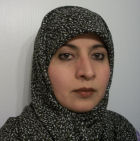Tazeen Mohsin, 42, genetics researcher at the University of Karachi, Pakistan. Family has played an important role in Tazeen Mohsin’s career, particularly when she was diagnosed with breast cancer in 2008.
Mohsin: ‘I got enormous help from my husband. But not everyone has the same luck’
Suhail Yusuf
Mohsin was completing a PhD in plant biochemical genetics at the time and had to put her studies on hold for almost a year while she underwent radiotherapy, chemotherapy and surgery.
Now in remission, she has been awarded her PhD and her thesis has been published. She has also received a Young Scientists Award, a three-year research grant that will enable her to continue her research into the enhancement of glutenin, a nutritious protein, in bread.
Mohsin credits her husband with supporting her throughout her career and helping her to balance her research, teaching and family responsibilities.
“The support from [a] husband is very important — it’s like a whole new world opens up for you,” she says. “I got enormous help from my husband. But not everyone has the same luck.”
She recalls another female researcher who got married after receiving her Master of Philosophy degree. “She tried to do her doctorate many times, but could not sustain her research because of a lack of support from her husband and in-laws.”
Women scientists face numerous hurdles in Pakistani society, Mohsin says. They are less likely to study science as there is a lack of investment in girls’ education. Parents also invest less in their daughters’ higher education because they usually expect them to remain at home once they are married.
Poverty is another hurdle. Although Mohsin lost her father at a young age, she had no financial difficulties because he had been a landlord and the family generated a significant amount of revenue from the land. For less fortunate women, scholarships and grants are the only options.
She says it is important for women scientists to be able to share their experiences, something that is currently lacking. She suggests a physical or virtual forum where women can share ideas and exchange research.
But Shazia Anjum, 39, former research associate at the University of Saskatchewan, Canada, does not feel that women are disadvantaged in her sphere of work in Pakistan.

Anjum: ‘[In Pakistan], women have their freedom … I don’t feel discriminated against’
Shazia Anjum
“[In Pakistan], women have their freedom. I see women working with men. I don’t feel discriminated against,” says Anjum, who has more than ten years of research experience in chemistry and was previously assistant professor at the HEJ Research Institute of Chemistry at the International Center for Chemical and Biological Sciences in Karachi. She admits that this may not have been the case five years ago, but believes that globalisation has precipitated change in Pakistan.
“People are more aware of what is happening elsewhere in the world and have realised that progress cannot be achieved if more than 50 per cent of the population is sitting at home doing nothing,” she says.
Anjum, who has visited Malaysia and Spain for her professional development, has authored and co-authored more than 80 research papers and has a US patent for isolating four anti-bacterial and anti-diabetic compounds from the evergreen shrub myrtle in Pakistan. In 2006 she was awarded the Izaz-i-Kamal Presidential Award, which few women have received.
Anjum’s father died when she was very young, so her mother decided to go to school — the first woman in her family to do so — to earn the money she would need to raise her two daughters. “I remember I was in grade three when my mother was taking her exams for grade eight,” Anjum recalls.
When Anjum chose to study chemistry, she became the first woman in her family to go to university. “It was a challenge for me. I had to speak out and convince my mother that I was committed,” she says.
Anjum has recently decided to return to Pakistan to pursue a career in her native country, and she hopes to establish a research institute in her home town of Bahawalpur.
According to Anjum, the real challenge to the scientific community in Pakistan is not gender discrimination, but the lack of facilities and dwindling political and financial support for research. Pakistan’s current regime, which was elected into office in 2008, does not support science, she says. “They are not investing funds in higher education. There is a huge brain drain.”
Closing the gap
Women scientists such as Anjum are still the exception rather than the rule. Most believe that much work remains to be done to break down stereotypes and close the gender gap, particularly at the top.
The scientists themselves have a key role to play in developing more top female researchers, says Mary Abukutsa-Onyango. “Only women taking up leadership positions in science will have an impact on women who go through it [pursue a career in research].” She believes that mentoring programmes — such as the African Women in Agricultural Research and Development scheme, which pairs budding researchers with senior professionals — can finally help to make this happen.
Reference:http://www.scidev.net/en/features/successful-women-scientists-how-did-they-do-it–1.html



